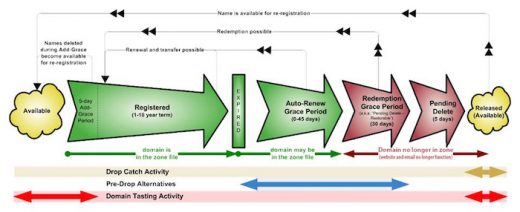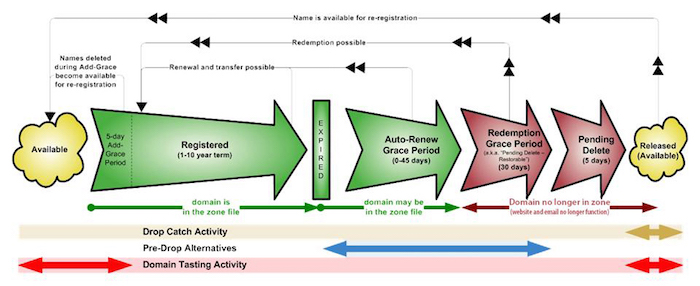It’s 2016: Do You Know When Your Domain Name Expires?
April 21, 2016

Domain names are the addresses you maintain to establish yourself on the Internet infobaun. A domain name is the flag you wave to get readers to stop into your site, the shingle you hang to get business online.
Without a domain name pointing to your site, no one would find it.
But, if your domain name expires and you lose ownership of it, you can lose all the hours of work you put into the site as well as the work put into ranking it in search engines.
In the same way a plot of land is registered with the county or municipality in which it’s located, domain names must be registered with a domain name registrar.
To become a domain name registrar, a company must be accredited by a generic top-level domain (gTLD) registry and/or a country code top-level domain (ccTLD) registry. That management is done in accordance with the guidelines of the designated domain name registries.
In other words, all domain names must be registered with a legitimate, bona-fide registrar, approved by The Internet Corporation for Assigned Names and Numbers (ICANN) or else you can be screwed.
Until 1999, Network Solutions was the only domain name registrar controlling the .com, .net, and .org registries. The end of that monopoly opened the doors for hundreds of registrars to compete in the domain registration space.
Now, there are probably as many domain name registrars in the world as there are channels on satellite TV. Here is a list of ICANN-accredited domain registrars.
But there are a growing number of scammers ready to take advantage of web site operators whose domain registration is about to lapse.
Domain Name Renewal Scams
Domain name scammers operate by pulling your domain information from public records, called a Whois, which shows the date of expiration and the administrators email address. You can pay your legitimate register to not publish this information, but having it displayed there is also handy for you.
A Whois can be found from private sources, whois.net, who.is, whois.com, or the official ICANN site, whois.icann.org.
How to spot a scam
You get an email or letter from a company you don’t recognize, and it reads something like this:

Note how it says, “This notice is not in any part associated with a continuation of services for domain registration.”
Or you receive this in the mail:

How do you know it’s a scam?
- You’ve never heard of this company and you know it’s not your registrar.
- You might remember the year your domain expires, and it’s not this one.
- The amount requested is wildly expensive. Since the break up of Networks Solutions’ monopoly, you can pay as little as $ 7 per year and no more than $ 15 per year.
- A Chinese registrar warns you that another company has applied for your domain name with a “.cn” suffix and would you like to buy that domain name yourself?
Falling for scammer solicitation is called slamming and will trigger a domain transfer. Don’t fall for it!
When a domain name expires

The lifecycle of a domain name. Graphic by ICANN.
When your domain expires, Google hears about it immediately and will automatically de-index your site thinking it’s been abandoned. So there goes your ranking.
According to ICANN,
“Once your domain has expired, it will be in Auto-Renew Grace Period (for 0-45 days), followed by a 30-day Redemption Grace Period. At the end of the Redemption Grace Period, you will not be able to renew your domain name. Your domain name will be released for registration by third parties.”
That means if you loose your domain name someone can purchase your domain name out from under you at auction. If your site had good ranking and lots of juicy backlinks it can get purchased by gray or black hatted internet marketers and turned into a junky referral site.
Imagine the classy object of your hard work turned into a low-down dirty whore for all the world to see!
Dangerous Domains
Purchasing domains through major providers like Google, or Amazon, to which you might have email or other properties connected, can jeopardize your whole business if you allow that domain to expire.
Worse yet is if your Google-registered domain then gets snapped up at auction. That buyer can obtain access to all your files and more!
How to check your domain
- Visit a whois to check on all your domains.
- Make sure you are registered as the owner.
- Watch for reseller information in case the original registrar sold your registration to another company over the course of years.
How to renew
Go to the site or the registrar listed in the Whois. If you purchased through your hosting provider, go to their site and click on “Domain.”
Renew for 5-10 years, so you don’t have to deal with the issue for a long time. Having a long renewal period tells Google you’re in it for the long haul, which will make them like you more.
Keeping a credit card on file for automatic renewal only works until the card expires, at which point the registrar will contact you.
Register responsibly
My reason for writing this post is due to multiple domain name scares and scams perpetrated on my clients recently. Those episodes have made me re-evaluate my awareness over domain names that I control and have worked with.
So, I looked up each domain and made a spreadsheet listing the registrars and dates for when each domain name expires. Already, I’ve sent warnings to clients that their expiration dates are approaching, so they don’t get confused by emails.
If you deal with multiple domain names, I suggest you do something similar.
Digital & Social Articles on Business 2 Community
(31)














